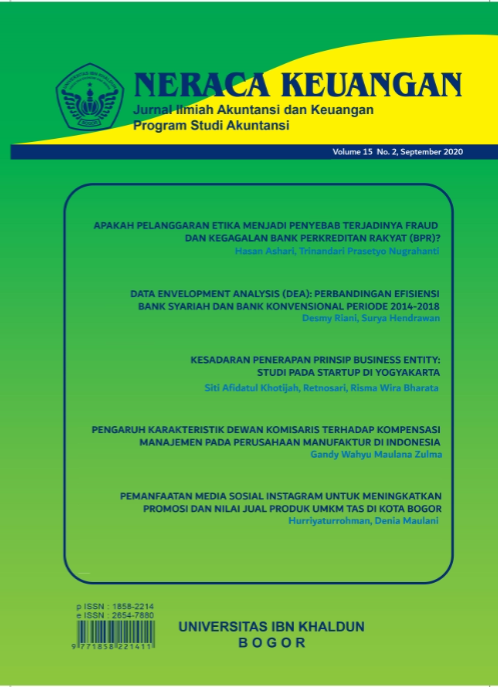APAKAH PELANGGARAN ETIKA MENJADI PENYEBAB TERJADINYA FRAUD DAN KEGAGALAN BANK PERKREDITAN RAKYAT (BPR)?
DOI:
https://doi.org/10.32832/neraca.v15i2.3497Abstrak
Penelitian ini bertujuan menjelaskan apakah pelanggaran etika menjadi penyebab fraud dan kegagalan bank yang terjadi pada Bank Perkreditan Rakyat (BPR) di Indonesia menurut perspektif auditor yang pernah melakukan penugasan audit di bank dalam likuidasi. Penelitian ini mengambil sampel 9 (Sembilan) auditor yang memiliki kompetensi dan kapabilitas untuk memberikan informasi dan fakta-fakta yang terjadi sesuai hasil audit yang dilakukan di BPR dalam likuidasi. Metodologi yang digunakan dalam penelitian ialah metode kualitatif dengan pendekatan deskriptif analisis. Berdasarkan hasil penelitian ini disimpulkan bahwa Prosedur audit utama yang dilakukan auditor dalam audit neraca penutupan (NP) yang dapat mengetahui dan/atau membuktikan adanya pelanggaran etika di Bank Perkreditan Rakyat adalah prosedur konfirmasi. Sedangkan pelanggaran etika menjadi penyebab utama terjadinya kegagalan bank adalah buruknya tata kelola BPR. Pelanggaran etika yang bersifat administratif maupun bukan administratif menjadi penyebab yang kuat terjadinya fraud dan kegagalan bank. Namun demikian pelanggaran etika bukan penyebab langsung terjadinya fraud di BPR, karena pelanggaran etika dapat bersifat administratif yang tidak menyebabkan terjadinya fraud. Fraud muncul tidak semata-mata karena pelanggaran etika namun dapat disebabkan hal lain yang bukan termasuk pelanggaran etika.
Kata Kunci: Etika, Kegagalan bank, Audit Bank Dalam Likuidasi
Referensi
Adeyanju, Olanrewaju David. (2014). Code of Ethics and Professionalism: Implication for Bank Failure in Nigeria. Research Journal of Finance and Accounting www.iiste.org. ISSN 2222-1697 (Paper) ISSN 2222-2847 (Online)Vol.5, No.19, 2014
AICPA Auditing Standards Board, Consideration of fraud in financial statement audit, American Institute Certified Public Accountants (AICPA), SAS No. 99(2002).
Arikunto, Suharsimi, 1991, Manajemen Penelitian, Jakarta, Rineka Cipta.
Aron. B. (2006).Ethics and Decision Making for Interpreters
Ashari, Hasan and Nugrahanti, TP. (2017). Implication of Liquidation Method to Recovery Rate and Residual Asset: The Case of Rural Banks in Indonesia Scientific. Scientific Journal of PPI-UKM, Vol. 4, No. 1, p. 43-54. ISSN No. 2356 – 2536. DOI: 10.27512/sjppi-ukm/ses/a15012018
Association of Certified Fraud Examiners (ACFE). (2000). ACFE Reports The Nations 2000
Atakan-Duman, S., & Ozdora-Aksak, E. (2014). The role of corporate social responsibility in online identity construction: An analysis of Turkey's banking sector. Public Relations Review, 40, 862–864. http://dx.doi.org/10.1016/j.pubrev.2014.07.004 0363-8111
Baker, R. (1999). Code of Ethics: Some History, Journal on Perspectives on the Profession. 19, 1, Fall 1999.
Carse, D. (1999). The Importance of Ethics in Banking. A paper presented at 2nd International Conference on Banking Ethics, Hong Kong.
Fatma, M., Rahman, Z., & Khan, I. (2014). Multi-item stakeholder based scale to measure CSR in the banking industry. International Strategic Management Review, 2, 9–20. http://dx.doi.org/10.1016/j.ism.2014.06.001
Ferreira, Fernando A.F., Jalali, Marjan S., Ferreira, Joí£o J.M. (2016). Experience-focused thinking and cognitive mapping in ethical banking practices: From practical intuition to theory, Journal of Business Research 69 (2016) 4953–4958. https://doi.org/10.1016/j.jbusres.2016.04.058
Green, C. (1989). Business ethics in banking. Journal of Business Ethics, 8, 631–634. https://www.jstor.org/stable/25071946
Guy, M. E. (1990). Ethical Decision Making in Everyday Work Situations. Westport: Quorum Books, 1, 5-6.
Hamada, M. (2010). Commercialization Of Microfinance In Indonesia: The Shortage Of Funds And The Linkage Program. The Developing Economies 48, no. 1, 156–76. https://doi.org/10.1111/j.1746-1049.2010.00102.x
International Association of Deposit Insurers (IADI). (2005), General Guidance for the Resolution of Bank Failures, The Research and Guidance Committee International Association of Deposit Insurers Working Paper.
Jalali, M., Ferreira, F., Ferreira, J., & Meidutć—-Kavaliauskienć—, I. (2016). Integrating metacognitive and psychometric decision making approaches for bank customer loyalty measurement. International Journal of Information Technology and Decision Making, 15, 815–837. https://doi.org/10.1142/S0219622015500236
Jasevićienć—, Filomena. (2012). The Ethics of Banking: Analysis and Estimates, ISSN 1392-1258. Ekonomika 2012 Vol. 91(3) Vilnius University, Lithuania. https://DOI.org/ 10.15388/Ekon.2012.0.884.
Kasmir. (2015). Manajemen Perbankan. Jakarta: PT Raja Grafindo Persada. PERS
Kim, Moshe., Surroca, Jordi., Tribó, Josep A. (2014). Impact of ethical behavior on syndicated loan rates. Journal of Banking & Finance 38 (2014) 122–144. https://doi.org/ 10.1016/j.jbankfin.2013.10.006
Koslowski, P. (2008). Some Principles of Ethical Economy.
Koslowski, P. (2011). The Ethics of Banking: Conclusions from the Financial Crisis
Mocan, M., Rus, S., Draghici, A., Ivascu, L., & Turi, A. (2015). Impact of corporate social responsibility practices on the banking industry in Romania. Procedia Economics and Finance, 23, 712–716. https://doi.org/10.1016/S2212-5671(15)00473-6
Owualah, S. I. (1996).Contemporary Issues in Nigeria's banking and Finance. Lagos: GMagInvestmentsLtd, 1-57. [Url:http:// www.theconvention.org/pdf/regulations_ Code Of Ethics In Banking And Finance]
Paulet, E., Parnaudeau, M., & Relano, F. (2015). Banking with ethics: Strategic moves and structural changes of the banking industry in the aftermath of the subprime mortgage crisis. Journal of Business Ethics, 131, 199–207. https:// www.jstor.org/stable/24703497
Polychronidou, P., Ioannidou, E., Kipouros, A., Tsourgiannis, L., & Simet, G. (2014). Corporate social responsibility in Greek banking sector: An empirical research. Procedia Economics and Finance, 9, 193–199. https://doi.org/10.1016/S2212-5671(14)00020-3
Reis, J., Ferreira, F., & Monteiro-Barata, J. (2013). Technological innovation in banking services: An exploratory analysis to perceptions of the front office employee. Problems and Perspectives in Management, 11, 34–49.
Simpson, W., & Kohers, T. (2002). The link between corporate social and financial performance: Evidence from the banking industry. Journal of Business Ethics, 35, 97–109. https://doi.org/10.1023/ A:1013082525900
Singleton, Hall. (2007). Information Technology Auditing and Assurance. Edisi Kedua, Salemba Empat,Jakarta
Sugiyono. (2014). Metode Penelitian Manajemen. Bandung : Alfa Beta
Sumanto. (2014). Teori dan Aplikasi Metode Penelitian. Yogyakarta : CAPS
Sunardi, Sunardi, Pradesa, Hafid A. (2019). An empirical evidence of ethical climate index in rural banks from Board of Directors Perspective. Journal of Economics, Business, and Accountancy Ventura Vol. 21, No. 3, December 2018 – March 2019, pages 373 – 377. http:// doi.org/10.14414/jebav.v21i3.1590
Tayşir, E., & Pazarcık, Y. (2013). Business ethics, social responsibility and corporate governance: Does the strategic management field really care about these concepts? Procedia - Social and Behavioral Sciences, 99, 294–303. http://doi.org/10.1016/j.sbspro.2013.10.497
Umar, H. (2016). Corruption The Devil. Jakarta: Trisakti University Publisher
Zheng, C., & Ashraf, B. (2014). National culture and dividend policy: International evidence from banking. Journal of Behavioral and Experimental Finance, 3, 22–40. https://doi.org/ 10.1016/ j.ribaf.2016.01.015





















